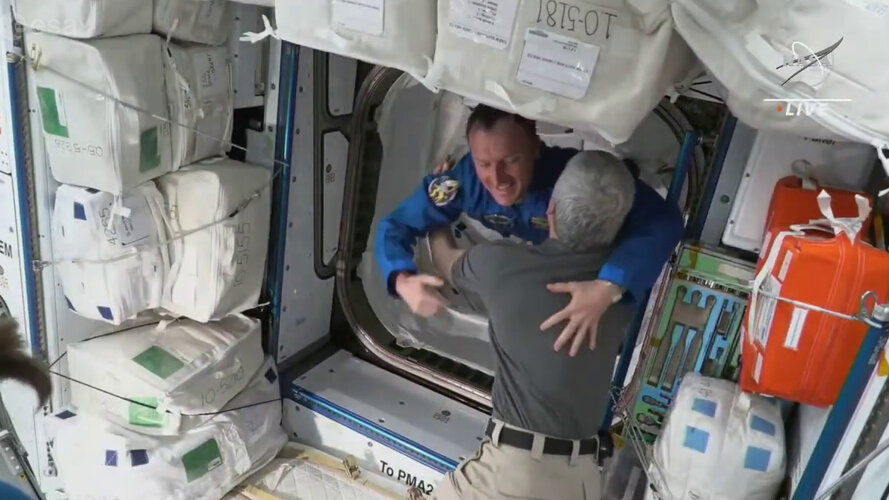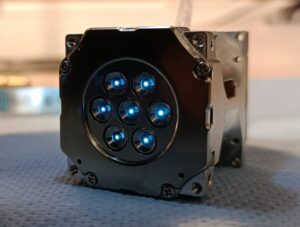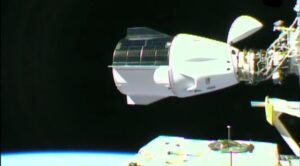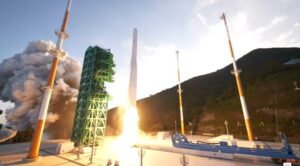Matthias Maurer arrives at the International Space Station
Friday, 12 November 2021 07:38 With the launch of 'Cosmic Kiss', Matthias Maurer's long-cherished dream comes true. The Saarland native is the fourth German to travel to the International Space Station (ISS). He departed from Kennedy Space Center in Florida at 21:03 local time on 10 November 2021 (03:03 CET 11 November 2021). The 51-year-old materials scientist from Sankt Wendel has been a member of the European Space Agency
With the launch of 'Cosmic Kiss', Matthias Maurer's long-cherished dream comes true. The Saarland native is the fourth German to travel to the International Space Station (ISS). He departed from Kennedy Space Center in Florida at 21:03 local time on 10 November 2021 (03:03 CET 11 November 2021). The 51-year-old materials scientist from Sankt Wendel has been a member of the European Space Agency Near-earth asteroid might be a lost fragment of the moon
Friday, 12 November 2021 07:38 A near-Earth asteroid named Kamo`oalewa could be a fragment of our moon, according to a new paper published in Nature Communications Earth and Environment by a team of astronomers led by the University of Arizona.
Kamo`oalewa is a quasi-satellite - a subcategory of near-Earth asteroids that orbit the sun but remain relatively close to Earth. Little is known about these objects because they
A near-Earth asteroid named Kamo`oalewa could be a fragment of our moon, according to a new paper published in Nature Communications Earth and Environment by a team of astronomers led by the University of Arizona.
Kamo`oalewa is a quasi-satellite - a subcategory of near-Earth asteroids that orbit the sun but remain relatively close to Earth. Little is known about these objects because they MDA awarded initial design phase contract for lunar rover
Friday, 12 November 2021 07:38 MDA has been awarded a contract by the Canadian Space Agency (CSA) to undertake a Phase A initial design study for a Canadian Lunar Rover mission to the Moon. As part of the CSA's Lunar Exploration Accelerator Program (LEAP), the Lunar Rover will advance eight key technologies that are foundational building blocks for planetary rovers, including mobility, communications, operations, thermal cont
MDA has been awarded a contract by the Canadian Space Agency (CSA) to undertake a Phase A initial design study for a Canadian Lunar Rover mission to the Moon. As part of the CSA's Lunar Exploration Accelerator Program (LEAP), the Lunar Rover will advance eight key technologies that are foundational building blocks for planetary rovers, including mobility, communications, operations, thermal cont Webb's Ariane 5 core stage made ready
Friday, 12 November 2021 07:38 Ariane 5 parts are coming together in the launch vehicle integration building for the launch of Webb from Europe's Spaceport in French Guiana.
The Ariane 5 core stage is 5.4 m diameter and 30.5 m high. On 6 November it was taken out of its shipping container and raised vertical.
At launch it will contain 175 t of liquid oxygen and liquid hydrogen propellants. With its Vulcain 2 engin
Ariane 5 parts are coming together in the launch vehicle integration building for the launch of Webb from Europe's Spaceport in French Guiana.
The Ariane 5 core stage is 5.4 m diameter and 30.5 m high. On 6 November it was taken out of its shipping container and raised vertical.
At launch it will contain 175 t of liquid oxygen and liquid hydrogen propellants. With its Vulcain 2 engin Docking the Perseverance robotic arm
Friday, 12 November 2021 07:38 Every time we collect a rock sample on Mars, Perseverance performs an hours-long set of carefully choreographed operations with its robotic arm, the coring drill, and the Adaptive Caching Assembly. One of these operations is docking: the process by which the arm aligns itself with the Bit Carousel on the front of the rover, so that the corer can drop off and pick up new drill bits.
Docking
Every time we collect a rock sample on Mars, Perseverance performs an hours-long set of carefully choreographed operations with its robotic arm, the coring drill, and the Adaptive Caching Assembly. One of these operations is docking: the process by which the arm aligns itself with the Bit Carousel on the front of the rover, so that the corer can drop off and pick up new drill bits.
Docking China releases information of 15 new lunar samples online
Friday, 12 November 2021 07:38 China has released the information of the third batch of lunar samples brought back by the country's Chang'e-5 mission.
Public users can log on to the website of China's Lunar and Deep Space Exploration (www.clep.org.cn) to check for the related information of the 15 new samples and submit applications for research.
The Chang'e-5 probe returned to Earth on Dec. 17, 2020, retrieving a
China has released the information of the third batch of lunar samples brought back by the country's Chang'e-5 mission.
Public users can log on to the website of China's Lunar and Deep Space Exploration (www.clep.org.cn) to check for the related information of the 15 new samples and submit applications for research.
The Chang'e-5 probe returned to Earth on Dec. 17, 2020, retrieving a Hunting for alien planets
Friday, 12 November 2021 07:38 Thousands of alien worlds are known to orbit stars beyond our solar system. And many more worlds, possibly harboring life, lie waiting to be discovered. A new astronomical instrument called NEID, the NN-explore Exoplanet Investigations with Doppler spectroscopy, has come online in 2021 to help scientists hunt for new alien worlds.
The Texas Advanced Computing Center (TACC) is assisting the
Thousands of alien worlds are known to orbit stars beyond our solar system. And many more worlds, possibly harboring life, lie waiting to be discovered. A new astronomical instrument called NEID, the NN-explore Exoplanet Investigations with Doppler spectroscopy, has come online in 2021 to help scientists hunt for new alien worlds.
The Texas Advanced Computing Center (TACC) is assisting the Circumbinary planet discovered by TESS validates new detection technique
Friday, 12 November 2021 07:38 A new technique developed in part by Planetary Science Institute Senior Scientist Nader Haghighipour has allowed astronomers to quickly detect a transiting circumbinary planet orbiting around two suns, according to a new Astronomical Journal paper on which Haghighipour is an author.
Circumbinary planets are planetary bodies that rotate around two stars. Although for years, they were merely
A new technique developed in part by Planetary Science Institute Senior Scientist Nader Haghighipour has allowed astronomers to quickly detect a transiting circumbinary planet orbiting around two suns, according to a new Astronomical Journal paper on which Haghighipour is an author.
Circumbinary planets are planetary bodies that rotate around two stars. Although for years, they were merely Roman Space Telescope will help drive new era of cosmological discovery
Friday, 12 November 2021 07:38 A team of scientists has forecast the scientific impact of the Nancy Grace Roman Space Telescope's High Latitude Wide Area Survey on critical questions in cosmology. This observation program will consist of both imaging, which reveals the locations, shapes, sizes, and colors of objects like distant galaxies, and spectroscopy, which involves measuring the intensity of light from those objects at
A team of scientists has forecast the scientific impact of the Nancy Grace Roman Space Telescope's High Latitude Wide Area Survey on critical questions in cosmology. This observation program will consist of both imaging, which reveals the locations, shapes, sizes, and colors of objects like distant galaxies, and spectroscopy, which involves measuring the intensity of light from those objects at James Webb Space Telescope will reveal new insights into astrochemistry
Friday, 12 November 2021 07:38 On Dec. 18, the James Webb Space Telescope (JWST) will launch from French Guiana to its destination almost a million miles from Earth. The telescope will give scientists unprecedented views of chemistry occurring throughout the universe. This information will provide new insights into how planetary systems form and whether life-sustaining conditions exist elsewhere in the universe, according to
On Dec. 18, the James Webb Space Telescope (JWST) will launch from French Guiana to its destination almost a million miles from Earth. The telescope will give scientists unprecedented views of chemistry occurring throughout the universe. This information will provide new insights into how planetary systems form and whether life-sustaining conditions exist elsewhere in the universe, according to Crew-3 docking replay
Friday, 12 November 2021 07:30 Video:
00:06:35
Video:
00:06:35
Relive the moment the SpaceX Crew Dragon spacecraft, Endurance, docked to the International Space Station with ESA astronaut Matthias Maurer and his NASA colleagues Raja Chari, Tom Marshburn and Kayla Barron on board.
Docking took place at 23:32 GMT Thursday, 11 November/00:32 CET Friday, 12 November, around 22 hours after Crew-3 was launched atop a Falcon 9 rocket from NASA’s Kennedy Space Center in Florida, USA.
Crew Dragon docking is autonomous. Once docked, astronauts on Endurance and aboard the Space Station conducted standard leak checks and pressurisation before the hatch between the two spacecraft was opened at 01:25 GMT/02:25
Morpheus unveils Sphere product line for satellite constellations
Friday, 12 November 2021 05:08
Morpheus, a German propulsion startup that opened an office in Los Angeles earlier this year, unveiled a suite of products, called the Sphere ecosystem, that are designed to work together to reduce the cost and complexity of satellite constellation operations.
Crew-3 arrives at ISS
Thursday, 11 November 2021 23:29
A Crew Dragon spacecraft docked with the International Space Station Nov. 11, less than 24 hours after its launch from Florida.
South Korea to develop reusable rocket with 100-ton thrust engines
Thursday, 11 November 2021 20:52
The plan to develop a reusable rocket came as a surprise because “reusability” was nowhere to be seen in the government’s budget request for 2022 — in which South Korea’s next-generation rocket was supposed to be an expendable rocket.
Space Force leader suggests education secretary should be on the National Space Council
Thursday, 11 November 2021 20:38
arly education about the value created by space technology should be a national priority, the top enlisted leader of the U.S. Space Force said Nov. 11.

